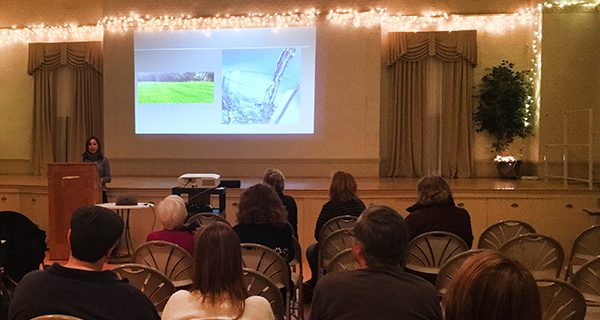[ccfic caption-text format="plaintext"]
By Katrina Margolis
Hometown Weekly Reporter
The Great Healthy Yard Project is an environmental non-profit organization working to improve and protect the quality of drinking water in order to help families lead healthier lives. Diane Lewis, the founder of this project, spoke at the Sherborn Library at its new location in the Community Center. Her talk was sponsored both by the library and by the Garden Club of Sherborn. Sherborn and the surrounding area is one of the most densely-populated watersheds in New England, making it an exceptionally important area for the kind of change Lewis promotes.
“A serious widespread threat to drinking water is from pesticides, and insecticides that we flush down the drain,” Lewis explained. “Some of them rub off on our children, our pets, and they are brought into our homes and they become part of the dust. Others are washed with the rain water into our streams, ground water aquifers, and they go into our drinking water.”
Lewis is an exceptionally well-educated physician who has had articles regarding the state of our water published in the New York Times. She emphasized that our involvement in these changes is so important because most pesticides are used on homeowners’ lawns, not on farms. “Why is this more important now than ever before? Mostly because there are more of us,” she explained.
Another reason it is so important is due to research showing the effects that these chemicals can have on the endocrine system. “In 2009, The Endocrine Society, which is a society made up of doctors, researchers in the field, published a position paper, which medical societies almost never do, and this statement said there was a definite link between these chemicals and destruction of the endocrine and hormonal system,” Lewis explained. The endocrine system effects sex hormones, the adrenal glands, the thyroid and more. The reason that these chemicals are so exceptionally dangerous is because unlike carcinogens, endocrine disruptors cause problems in very small amounts. “What matters more is the time of exposure, so children are more susceptible and can have lifelong problems from exposure at the wrong time,” Lewis said.
Most of what is flushed down Sherborn drains winds up the Charles River – a scary thought, knowing that people fish and boat in the Charles. Lewis ended her presentation really emphasizing one thing: “You can have a really heathy lawn without using these chemicals!”
One of the most effective ways of doing this is by focusing on planting indigenous flora, which not only thrive without chemicals, but also draw in pollinators such as bees and butterflies. Not only will moving away from these chemicals help people, but the environment and ecosystem as a whole.

























